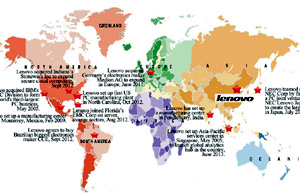Lenovo CEO urges legal steps to protect private info
By Jiang Xueqing (China Daily) Updated: 2014-03-19 07:38Among those who go online with their smartphones, 68.6 percent received spam text messages during the first half of 2013, 57.2 percent received harassing phone calls or text messages and 33.2 percent encountered malware, said a report published last September by the China Internet Network Information Center.

|
The booming popularity of mobile payments also brought huge security challenges such as attacks by Trojan horse viruses via the latest technologies.
The malware, disguised as various apps, lured users to install it, said Qu, who said users should download only from reputable app stores.
Other threats involving mobile payments include text message scams.
According to the CNNIC report, 30 percent of the mobile Internet users have never installed network security software on their smartphones. Many people think they don't need it because they have never encountered a security incident. Some are worried that the running speed of their phones will slow down after they install security software.
"The users should be more aware of the potential risks of exposing their personal information," said Qu of Qihoo 360 Technology. "They should install network security software that can tell which apps are collecting sensitive personal information by reading their text messages, call logs and phonebooks or using GPS to track their positions."
|
 |
 |
| Preview for 2014: key PC players | Lenovo extends global outreach |
- NHTSA says finds no 'defect trend' in Tesla Model S sedans
- WTO rare earth ruling is unfair
- Amway says 2014 China sales may grow 8%
- President Xi in Europe: Forging deals, boosting business
- CNOOC releases 2013 sustainability report
- Local production by Chery Jaguar Land Rover this year
- Car lovers test their need for speed in BMW Mission 3
- China stocks close mixed Monday


















